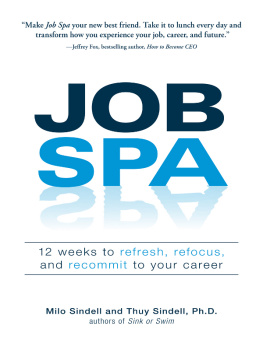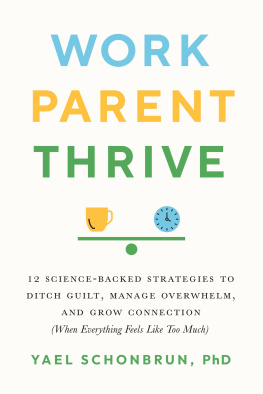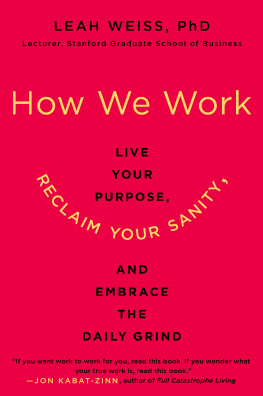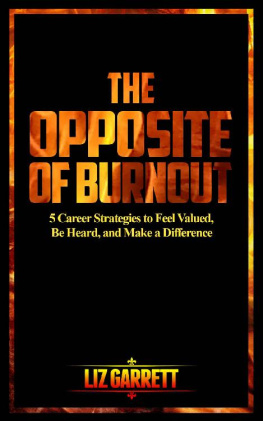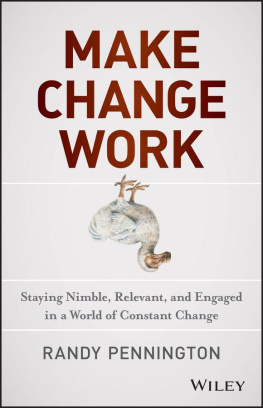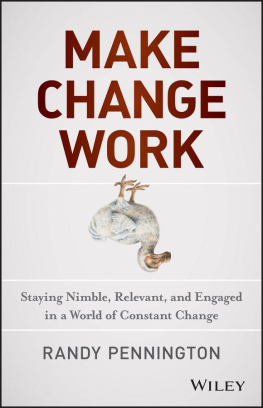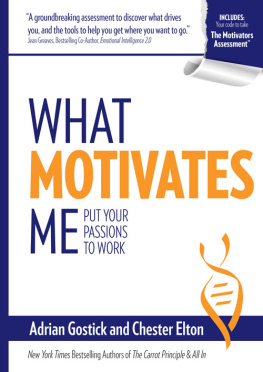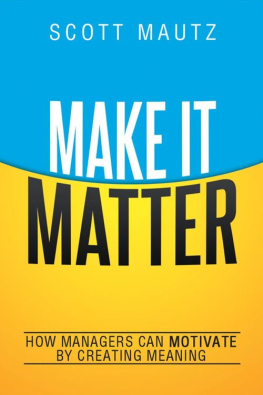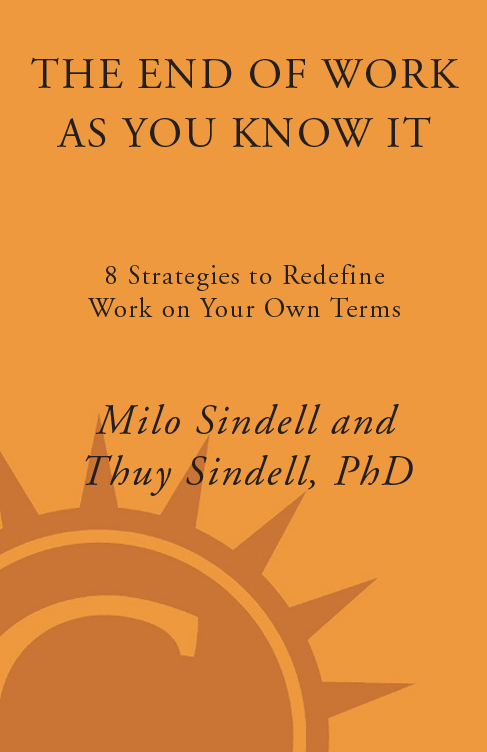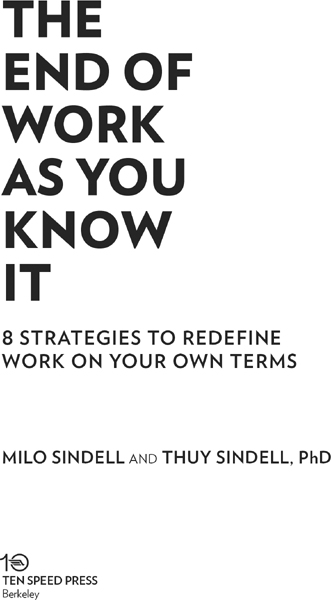Wed like to thank our agent, Kimberley Cameron, for seeing the possibilities for how this piece of work will change peoples lives and their experience of work. Wed also like to thank the Ten Speed team for getting behind the book and bringing it to life. Finally, wed like to thank all the people weve encountered in our personal and professional lives who have influenced us and were the inspiration for this book.
And especially to Ava, who has brought an unprecedented depth, meaning, and love into our lives.
PREFACE
The contemporary workplace is dynamic, fickle, and complex. We spend the bulk of our waking hours living and breathing work. Given the amount of time spent on the job, shouldnt we get what we want from the experience? Theres no need to drag yourself out of bed every morning to face another day filled with stress and frustrating colleagues. Work is ideally a place where you gain a sense of achievement and alignment between who you are and what you do. The workplace is fertile ground to achieve personal goals, manifest the values that you hold important, and create a sense of deep accomplishment.
Idealistic? Yes. Realistic? We believe so. It is easy to dismiss the workplace with Dilbert-like sarcasm. Even we can easily find ourselves taking a negative tone about workplace relations. We have worked for and consulted to some of the best-known companies and can safely say that politics, stupidity, and the worst of human nature is very much a part of the work landscape. The challenge and opportunity lie not just in finding the good in your job butmuch more importantin discovering alignment between who you are and what you do.
In our first book, Sink or Swim, we wanted to guide new hires step-by-step to ensure their success. Our second book, Job Spa, soon followed because we recognized the need for a book that guided employees to become more engaged in their current jobs by taking more accountability for their success and looking for the opportunities to both give more to and take more from their work. Then we realized that instead of helping people become more engaged with work, we could help prevent them from being disengaged from the start. If we can help people create a workday experience in which they know they will be stimulated and they are achieving the goals they set for themselves, it will no longer feel like work. Seventy-one percent disengagement in the workplace (according to Gallup, 2004) will no longer be a reality.
Most of us feel disconnected from our work because we work not for ourselves and our dreams and goals, but for our companys goals. The following story is an example of how this disconnect is propagated and reinforced in our society today.
In June 2007, we attended the graduation ceremony of four thousand newly minted East Coast Ivy-Leaguers. Before us was a crowd of bright-eyed students, eager to pass over the threshold of college into the world. We were looking at the future. The excitement was contagious.
Like most attendees, we were looking forward to the keynote, which was going to be delivered by a local professional sports coach. Giving a keynote to a group of knowledge-filled, get-me-out-of-here, soon-to-be-grads is not easy. Handing them warmed-over platitudes is a minimum expectation. We did not expect too much enlightenment. Fortunately, our levels of surprise and amusement were about to be spiked.
The fearless keynoter started off framing for our eager grads the habits and character critical to every soon-to-be employees success. As he transitioned to a story about food, our attention perked up. The story took the all-American breakfastbacon and eggsand turned it into the worst of budding new employee brainwash. As we listened, the speaker transformed bacon and eggs into the litmus test of character and the choice for our new grads to make.
According to our speaker, there are two types of people: chickens and pigs. On the one hand, the chicken just lays its eggs, provides a product for anyones breakfast, and keeps on clucking. Its commitment is passing. We listened, awestruck. As a chicken employee, the coach explained, you are in it for yourself. The pig, on the other hand, is truly committed. There is no going back once the bacon is on the plate. Pig employees commit to the employers unwaveringly.
As grads transitioning into the world of work, the speaker continued, you have to decide whether you are one of the chickens who are working for companies on their own (the chickens) terms, or one of the pigs, who are willing to commit all the way. The speaker insisted that good employees are pigs. Are you a pig?
We were amazed. What an incredibly unhealthy expectation to place on anyone, especially an audience of bright, motivated fledglings entering the world of work.
Youve probably heard some variation on this story, in which you were told that a good employee listens to the boss and stays loyal to the company despite its shortcomings. Promoting the idea that a good employee blindly commits to the company and job is mind-boggling. This choice is not only dangerous and naive for the employee, but also not in the best interest of the employer. As an employee, first and foremost, you need to commit to your success. Self-commitment is the prime principle of a long and fortuitous career. Similarly, employers need workers who are clear on their contribution, agile enough to move with change, and not rigidly fixated on a blind commitment that has outlived its use. The right balance is a full-time commitment to your own success and an evolving commitment to a series of employers, depending on your career needs.
We have committed our careers to helping every working individual find their raison dtre and voice. Work should be an outlet for you to achieve your professional goals. Its tragic that most people begin and continue throughout their lifetime to work without understanding what they truly want from the experience. Most people blindly commit and follow. The bacon and eggs story plays itself out again and again. There is so much more potential to achieve great things as part of your job than choosing which barnyard animal represents your inner employee.
When there is harmony between what you do, why you do it, and the results you achieve, you have created the end of work as you know it. Why would you want to create your end of work? If you see work as a means to an end (that is to say, a paycheck or rsum builder), you probably feel trappedmaybe even resentful that you have to go to work. If you want to feel more positive toward the experience of work, youve got to figure out whats in it for you beyond a paycheck. When you do, you will have discovered the end of work as you know it. Work will take on a different meaning for you.
At a macro level, this book will help you see what you do professionally in a new way. It will guide you to make powerful choices and create greater alignment between who you are and what you do for a living. At the day-to-day level, you will discover the tools to get back on track when you find yourself disengaged and frustrated with work.
In the following pages, we offer you the opportunity to claim your professional autonomy, helping you to find freedom through choice, define what you want to achieve, and shape your perspective to accomplish what you want in the places you work throughout your life.


